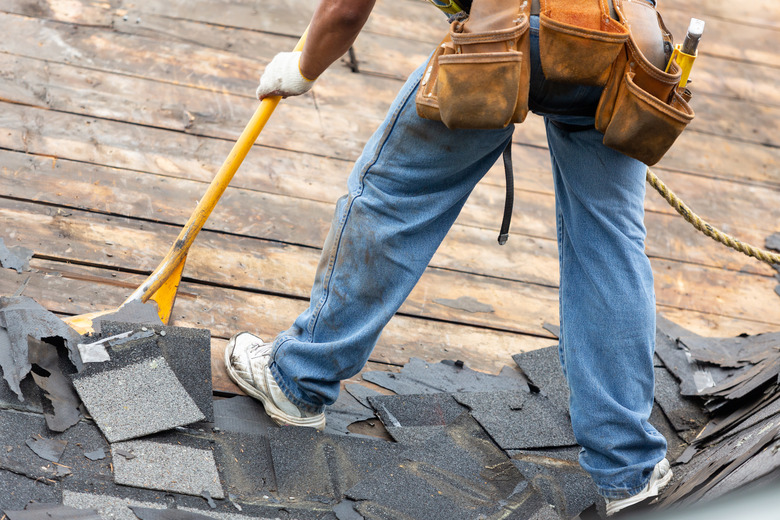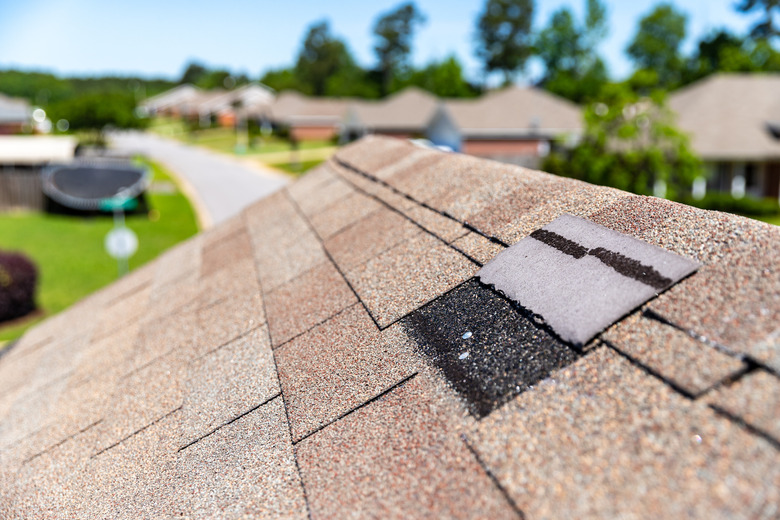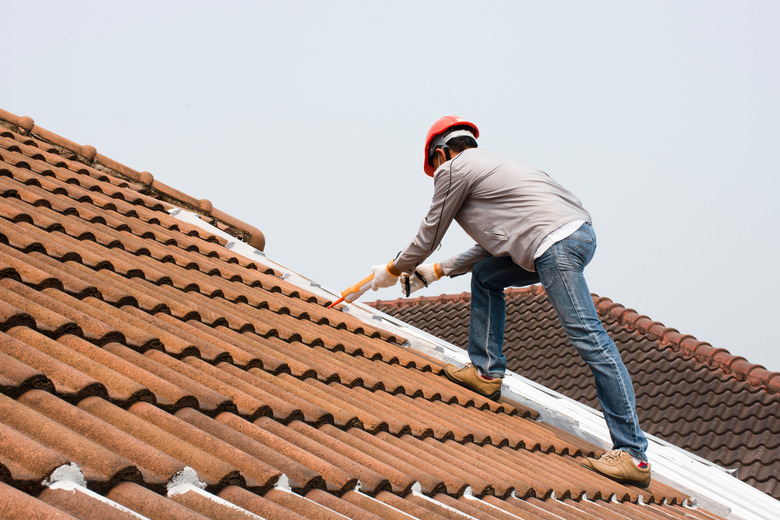How To Hire A Roofer
It's never a great day when you have to hire a roofer — whether it's a small roof leak or a storm that completely blew away most of your shingles. But, even if you'd like to save a bit of cash, fixing a roof generally isn't considered a DIY project. Roofers not only have the expertise and tools to plug roof leaks or provide a whole new roof that you likely don't, but they also have the knowledge and safety equipment to keep themselves from getting hurt on the job.
Need to hire a roofer and don't know where to start? Here's a guide to hiring the best roofer for the job — and how much it'll approximately cost you.
What a Roofing Contractor Does
What a Roofing Contractor Does
A roofing company — which could be a small three- or four-person operation or a larger company with multiple crews — either fixes or installs new roofs. Some remodeling companies also include roofing as one of the services offered, along with siding, window installations, and other home improvement projects.
If you have a leak in a roof that is otherwise in good condition, the roofer can find the source and know what materials will fix it. While they are on the roof, they can also spot other areas that may develop into problems later.
Replacing an existing roof, on the other hand, is more complicated than fixing a simple leak. Some of the roofer's tasks include:
- Visiting your home to take measurements and discuss your material options.
- Providing a written estimate. The estimate and contract should include information on product and labor warranties.
- Securing construction permits if necessary. (Note that some states and municipalities do not require a building permit for a roof replacement.)
- Ordering roofing materials, which include the finish roofing material (such as asphalt shingles, flashing, drip edge, self-sticking ice dam underlayment, roofing felt, roofing nails, etc.).
- Arranging for a dumpster to dispose of roofing debris.
- Hiring a gutter installer. Some roofers rely on subcontractors to install gutters and downspouts.
- Removing the existing roof.
- Inspecting and repairing the roof deck.
- Installing the new roof.
- Cleaning up the area. A roofer will inspect the ground for dropped nails and other fasteners.
If the roof repair or replacement is the result of damage that is covered by your homeowners' insurance policy, the roofer can help with the claim-filing process. In most cases, you can hire any qualified roofing company, although many insurance companies maintain a list of preferred contractors.
The specifics vary from insurance company to insurance company, but both you and the roofer should document the damage with photographs before making any repairs. The roofer should write up an estimate that you can submit as part of your claim, and they should accompany the insurance adjuster as they inspect the damage.
Doing Your Homework
Doing Your Homework
Although you might think "a roof is a roof," there are actually a lot of decisions to make and materials to decide upon before you hire a roofer.
Type of Shingles
The most popular roofing material is asphalt shingles (technically called composition shingles), which are used on 75 to 80 percent of the homes in this country. The material comes in dozens of colors, and the look ranges from flat shingles to deeply textured products, called architectural shingles. There are also many other roofing materials from which to choose, however, including slate, wood shakes and shingles, tile, and metal. All have distinctive looks, and you should settle on one type before calling a roofer.
While most roofers can install asphalt shingles, not everyone in the trade is an expert at other types. If you're interested in installing a slate or wood shake roof, it's a good idea to limit your search for a roofer to companies that specialize in that material. It's also pertinent to check for any limitations on roof material and color if you're part of a homeowners' association, or if you own a home in a historic neighborhood that can't be altered significantly.
Gutters and Downspouts
A roof replacement also usually includes new gutters and downspouts, which means you'll need to decide on materials and colors beforehand. The most common gutter materials include seamless aluminum that is fabricated on-site and vinyl gutters that come in precut lengths. They aren't very common, but you can also get gutters made of copper and even wood. Most roofers choose aluminum gutters by default, so if you want something else, speak up before the contract is finalized.
Attic Ventilation
Most roofs include some means to provide attic ventilation. A combination of soffit and roof or ridge vents is one popular type of attic ventilation, but there are others. If the roofing estimate or contract does not mention ventilation, be sure to ask about it. A properly ventilated attic gets rid of excess moisture in the air, which can damage building components in the attic. It also helps keep the roof deck cold in winter to help prevent ice dams in snowy climates.
Roofing Contractor vs. Handyman
Roofing Contractor vs. Handyman
For simple repairs, such as replacing some missing shingles or sealing an opening along a chimney or skylight, the job can be handled by a handyman. For a full roof replacement, however, it is best to go with a professional roofer.
Roofing contractors do the job every day and know the proper installation methods for different roofing materials. They know how to lay out the materials so that the courses are straight and no two seams line up with one another — a situation that could lead to a leak. They also tend to pay special attention to flashing roof penetrations because these areas are more prone to leaking than the rest of the roof.
The roofing hammer is an indispensable tool, but most roofers use nail guns to speed the job along and to make sure the nails are driven correctly. A roofing company is more likely to have ladder lifts or some other mechanical means for transporting roofing materials from the ground to the roof. This can help the job go faster because more of the crew will be installing the roof rather than carrying materials on ladders.
Then, there is the confidence that comes from zipping up and down ladders and walking and working on sloped surfaces all day. They are used to the working conditions. Professional roofers value safety, and they usually have safety equipment, such as safety harnesses, at the job site.
If your roofing project involves an insurance claim, a pro roofer can be an advocate for your cause and can work with the claims adjuster to make sure you get a fair settlement. If your state requires that roofers be licensed, the insurance company may refuse to reimburse you for damages if the company or person who does the work does not have the required license.
Questions to Ask a Roofing Contractor Before Hiring
Questions to Ask a Roofing Contractor Before Hiring
Replacing an existing roof is a big-ticket item that most homeowners only go through once or maybe twice if they stay in the house for an extraordinarily long time. Find possible candidates for your roofing job by consulting with neighbors and friends about their roofing experiences. Other contractors are good sources for referrals, so if you've worked with another type of tradesperson in the past, ask for a recommendation.
Questions to ask potential candidates include:
- Are you licensed? Requirements vary from state to state, and not all areas require roofers to be licensed.
- What types of insurance do you have? There are three types of insurance. Workers' compensation covers the roofing crew should someone become injured on the job. General liability insurance covers any damage to your home. A surety bond guarantees a payment to you if the roofer does not finish the job. Not all roofers are bonded unless it is a local requirement.
- Can you supply references? All roofers should be able to give you the names and contact information of past clients.
- Will you provide a written estimate? What will it include?
- What's your payment schedule? Most roofers will ask for a deposit when you sign the contract. The amount may be limited by law, but it should be no more than 10 to 25 percent of the total estimate. Never pay in full before the job starts and never submit your final payment until you are satisfied with the work.
- What type of warranty do you offer? There will be a warranty on the materials as well as a workmanship warranty. The materials warranty can last 20 to 50 years or more depending on the project. Workmanship warranties run from 5 to 25 years. There are cases where the two are combined in one lifetime warranty. In those cases, the contractor will be certified by the materials manufacturer, and the contractor will use products specified by the manufacturer.
- What are the start and end dates? Roofing projects can be delayed because of the weather.
The Cost of Hiring a Roofing Contractor
The Cost of Hiring a Roofing Contractor
The cost of any roofing job depends on the materials you select and the complexity of the job. Some materials cost significantly more than others, and there are differences among specific types of materials. For example, thick architectural asphalt shingles add visual interest to the roof, and they last longer than thin, three-tab products. They also cost two to three times more. Very steep roofs with lots of angles drive up the cost. In general, labor charges account for 40 to 60 percent of the cost of the project.
Roofers state the area of a roof in terms of squares rather than square feet, and a square equals 100 square feet. The approximate per-square installed cost of popular roofing materials is:
- Asphalt shingles: $300 to $800
- Wood shakes and shingles: $600 to $1,400
- Metal: $700 to $1,600
- Clay or concrete tiles: $1,000 to $2,400
- Slate: $900 to $2,500
Roofing Contractor Licensing and Certification
Roofing Contractor Licensing and Certification
Some states require roofers to be licensed. Obtaining a license usually means the roofer must show proof of insurance. In some cases, roofers must pass an exam before obtaining the license. In some areas, while they may not need a license to do roofing work, roofers do need to register their business with the state. Check with your state's licensing board or office of consumer affairs to learn the regulations in your state.
Many roofing material manufacturers offer training programs for roofers. The roofer becomes certified in the installation of that company's products. The manufacturer may also require the roofer to show proof of insurance and a good record with the Better Business Bureau. Roofers who are certified by a manufacturer can offer the best warranties the company has to offer. Most certification programs require recertification on a periodic basis.





